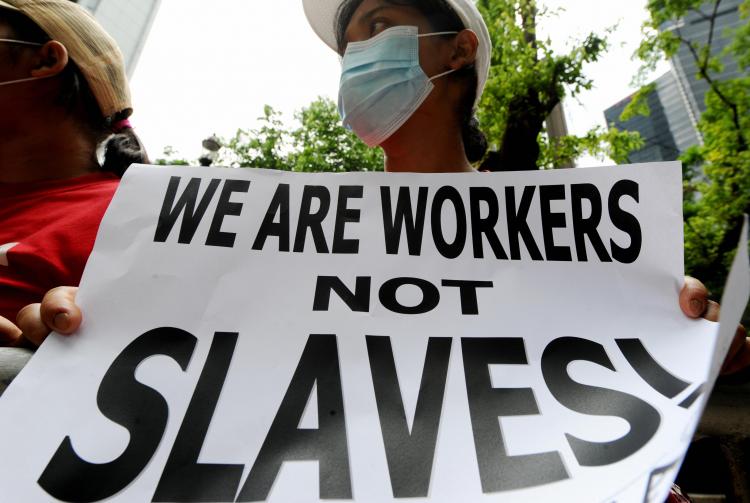Hong Kong has been downgraded to the Tier 2-Watchlist on the US State Department’s 2016 Trafficking in Persons report, meaning that the city has joined the ranks of countries such as Uzbekistan, Niger and Afghanistan in its performance in combating human trafficking within its borders.
The downgrade, announced on Thursday, came after seven consecutive years of the city being ranked at Tier 2. The annual report adopts a tier-ranking system of 1, 2, 2-Watch List and 3, with Tier 1 consisting of countries that perform best.

The report highlighted the circumstances faced by domestic workers in Hong Kong, saying that “some become victims of forced labor in the private homes in which they are employed.” Although it recognised that the government made significant efforts to meet the minimum standards for the elimination of trafficking, it “did not demonstrate overall increasing anti-trafficking efforts compared to the previous reporting period.”
It said there are limited efforts in the areas of anti-trafficking law enforcement and the protection of victims, and the government reported no efforts to prevent Hong Kong residents from engaging in child sex tourism in mainland China or other foreign countries. It also pointed out that the government did not provide anti-trafficking training to its personnel posted overseas.
Grading rejected ‘vehemently and categorically’
The government said in a press release issued on Thursday evening that it “vehemently and categorically” rejected Hong Kong’s grading in the report.
“We attach great importance to combating trafficking in persons… In particular, we cannot accept that Hong Kong is a destination, transit and source territory for men, women and children subjected to sex trafficking and forced labour.”

It said that the report did not do justice to the government’s efforts to tackle trafficking in persons or to improve procedures in this area, and claimed that the report “misquotes the level of assistance provided to trafficking victims, and contains an agglomeration of mere allegations, from unverified information, concerning the protection of foreign domestic helpers.”
It also said that since last year, there has been a standard procedure for law enforcement agencies to conduct debriefings to determine whether a vulnerable person is a victim of trafficking, and these guidelines are also being revised.
See also: NGO ‘far from surprised’ after HK ranks alongside North Korea, Iran, Eritrea in slavery index

The government added that there is no indication from official sources or otherwise that Hong Kong is actively being used by syndicates as a destination or a transit point for trafficking in persons, or that trafficking is a prevalent or widespread problem in Hong Kong. It also stressed the effort it has put into improving conditions for domestic workers.
“Trafficking in persons is not tolerated in Hong Kong. Our comprehensive legal framework, vigorous enforcement efforts, independent judiciary, rule of law and a clean government place us on a solid footing to combat human trafficking and related offences,” it said.
‘Not surprising’
Jade Anderson, the Anti-Human Trafficking Coordinator of local NGO Justice Centre Hong Kong, said, “Unfortunately, today’s announcement – as well as the government’s reaction – is not surprising.”
Anderson said that a recent report by Justice Centre revealed that one in six domestic workers are victims of forced labour, which shows the systemic abuse and exploitation of domestic workers in Hong Kong.

“The government can no longer sweep these problems under the carpet. This downgrade should offer serious reflection. The other countries in the same category are mostly low-developed countries, whilst Hong Kong is one of the cities with the most millionaires per capita in the world.”
“Clearly, resources are not the cause of inaction, but a lack of political will. Rather than categorically rejecting the findings and denying any problem, the government should urgently conduct a formal review on the situation of human trafficking and forced labour in the territory, in consultation with civil society.”

Shiella Estrada, chairperson of the Progressive Labour Union of Domestic Workers also slammed the report, saying “the Bureau of Labour and Welfare, continues to abdicate its responsibility in combating key elements of trafficking of migrant domestic workers for exploitation and forced labour.”
“The criminal business practices of countless employment agencies in Hong Kong exist because the Government has turned a blind eye, allowing a culture of virtual impunity. This can no longer go on. The Government must proactively apply the law with the plethora of evidence to prosecute and punish unscrupulous employment agencies,” she said.
